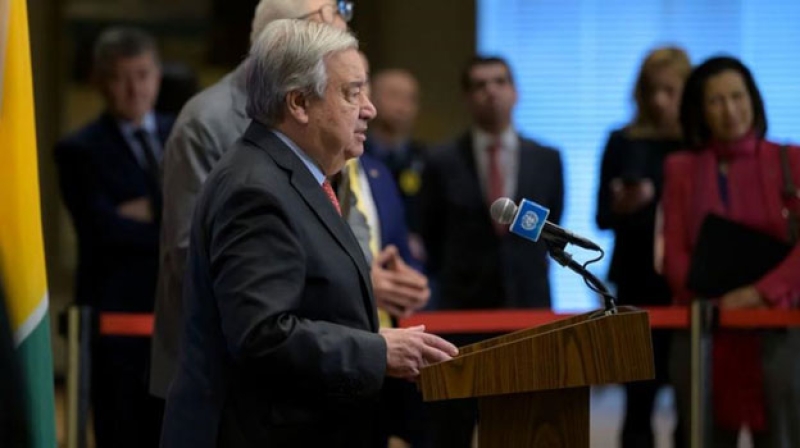- Inqilab Monch Seeks Home Adviser’s Exit |
- UN Calls for Calm in Bangladesh After Protest Leader’s Killing |
- DMP issues 7 traffic directives for Osman Hadi’s Janaza |
- Vested quarter fuelling chaos to impose new fascism: Fakhrul |
- Hadi’s namaz-e-janaza at 2:30pm Saturday |
A Cultural Revolution at the UN Is Long Overdue

UN Secretary-General António Guterres speaks at the launch of the UN80 Initiative, 1 May 2025. Credit: UN Photo
What would the UN80 Initiative—designed to commemorate the 80th anniversary of the United Nations—have looked like if Kamala Harris had won the U.S. presidential election last November?
This question kept returning to my mind as more details emerge about Secretary-General António Guterres' ambitious plans to restructure and reinvent the entire UN system.
The United Nations has grown into a sprawling “galaxy” of agencies, programmes, and offices, many with overlapping mandates. Without a second Trump administration, it’s likely that the shape of the UN80 Initiative would have been very different—possibly more cautious, and less transformative.
Take, for example, the UN 2.0 blueprint—an initiative launched in 2022 as part of the “Our Common Agenda” vision. While its language was full of promise, in truth, the plan fell flat. It offered catchy phrases about turning the UN into a “forward-thinking” institution, but it lacked the depth and direction necessary to make real change.
One of its few redeeming ideas, however, was the recognition that the UN’s internal culture needs a serious overhaul.
But what kind of cultural change does the UN really need?
Some argue the organisation should think and act more like a startup—agile, responsive, and innovative. While that may help cut through red tape, there's a danger in going too far. Mimicking venture-capitalist culture could erode the values that should be at the UN’s core: humility, service, and solidarity.
If the UN truly wants to act as a moral compass during these dark and uncertain times, any reform must be grounded in these principles. Sadly, over the years, the organisation has become increasingly disconnected—even in countries across the Global South, where its presence is strong and generally well-regarded.
This disconnect stems in part from a rigid, inward-looking working culture that often sidelines local engagement. Yes, the UN’s mandate to work through national governments is a factor, but it too often becomes a convenient excuse for ignoring civil society and grassroots voices.
The truth is more uncomfortable: UN staff have, consciously or not, evolved into an elite caste. Despite the sincerity and dedication of many UN professionals, the system isolates them from the realities on the ground.
This raises fundamental questions. Are the highly paid positions at the UN morally justified? Having a decent salary is one thing. But lavish perks and tax exemptions create a sense of privilege that undermines the institution’s credibility.
Why, for example, are so many UN events held in five-star hotels? It may seem trivial, but these choices symbolise a broader organisational malaise—a failure to lead by example and a tendency to waste resources that could be better invested in communities.
Accountability and responsiveness are still in short supply. Securing meetings with UN officials or receiving feedback on grassroots proposals can feel like trying to reach another planet. The institution’s leaders—many of them former top bureaucrats in their home countries—are often too far removed from ground realities to drive meaningful change.
Even the current discussions around reform are overly focused on structural efficiency: merging overlapping entities and reducing duplication. These efforts are welcome, but they miss a bigger point.
True transformation must go deeper. It must challenge the very mindset that has allowed inefficiency, privilege, and complacency to fester.
The UN should fundamentally reposition itself—not just as a facilitator of intergovernmental cooperation, but as a partner and champion of civil society. This is more urgent than ever, as civic space shrinks and democratic freedoms come under threat globally.
Supporting grassroots organisations should be a central part of the UN’s mission. That means consulting with local actors—even when governments are uncomfortable with it. It means shifting resources and attention away from bureaucratic machinery and towards local empowerment.
Furthermore, UN agencies should step back from their role as middlemen for donor countries. Too often, bilateral donors channel aid through UN agencies that hire expensive consultants and set up entire in-country teams. Why not redirect these funds to strengthen local NGOs directly—through training, resources, and long-term partnerships?
These proposals may provoke resistance from those who have thrived in the current system. But the status quo is unsustainable.
Ironically, it may take the pressure of a Trump administration to jolt the UN into action. Guterres now finds himself in a position where deep reform is no longer optional—it’s a necessity.
Yes, consolidating agencies and eliminating redundancies is important. But unless the organisation also embraces humility, transparency, and accountability, any reform will fall short of what our world truly needs.
Without a radical cultural reset, the UN risks becoming irrelevant. And that would be a profound loss—for global peace, for development, and for humanity itself.
The time to act is now. The status quo must go.
Simone Galimberti writes about the SDGs, youth-centred policy-making, and building a stronger, more accountable United Nations.

